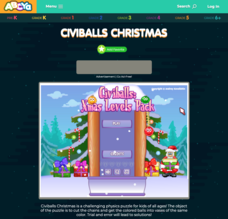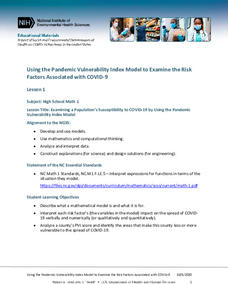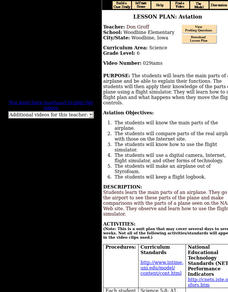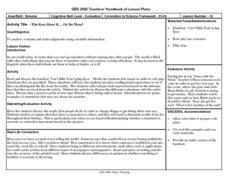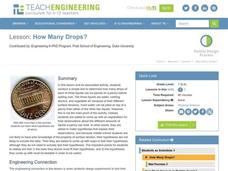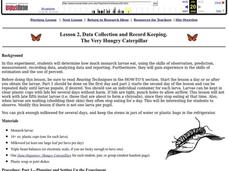Magic of Physics
Spring Motion
Get the class all wound up about spring motion! Science scholars manipulate interactive springs and observe the effects of change using an online activity. Customizable options include the number of springs as well as the spring and...
Biology in Motion
ATP and Energy Storage
Young children often appear to have endless amounts of energy. The interactive describes where energy comes from and how bodies turn food into a usable energy source. The comparison of ATP to a rechargeable battery helps pupils remember...
Magic of Physics
Wave Machine
Three main factors determine the wave height experienced in the ocean. Scholars use a virtual simulator to alter wind speed, fetch, and duration. Each combination creates a unique wave measured in significant height.
ABCya
Make a Snowman
Do you want to build a snowman? Of course you do! A fun and easily navigated game provides face pieces, hats, scarves, arms, and other fun accessories for young learners to create their perfect winter friend.
ABCya
Civiballs Christmas
For the holiday season, timing is everything—and a Civiballs game is no exception! Learners use strategy, timing, and a little bit of computer-generated luck to solve each level of a game in which they cut chains to release ornaments...
NOAA
I Didn’t Do It…Did I?: Make Your Own Greenhouse Effect
How do greenhouse gases affect the climate on Earth? Pupils explore the concept by first building their own apparatuses to model the greenhouse effect. Then, they record data to measure temperature change and determine that the amount...
EngageNY
End of Unit Assessment: Tracing and Evaluating Arguments
Give water the attention it deserves. Scholars watch Corporations Need to Pay More Attention to Water and respond to questions as part of their end of the unit assessment. They then complete the assessment by reading and responding to...
National Institute of Environmental Health Sciences
Lesson 1: Using the Pandemic Vulnerability Index Model to Examine the Risk Factors Associated with COVID-19
How vulnerable are you to COVID-19? High school mathematicians use the Pandemic Vulnerability Index to create models that help them collect and analyze data about the risk factors associated with COVID-19. After investigating four groups...
Overcoming Obstacles
Developing Personal Power
The final lesson in the series teaches participants that they can use their personal power to bring about positive change. The class engages in a series of activities that reveal the kinds of personal power they have, including the power...
Overcoming Obstacles
Developing Personal Power
Money? Beauty? Education? The final lesson in the Confidence Building module encourages middle schoolers to consider the power they have to determine the course of their lives. After investigating different forms of power, participants...
Curated OER
OPEC Research and Simulation
Students research the organizational structure of OPEC and its political and economic role. They simulate an OPEC meeting. They determine the circumstances that led to the formation of the OPEC cartel.
Curated OER
Teams-Games-Tournaments
Students draw cards from a pile and the student that draws the number card gets the first opportunity to answer the question. For example, if a student selects twenty-two from the pile and question twenty-two is, "why is government...
Curated OER
Explanations for Crime
For this Explanations for Crime worksheet, students complete a chart by describing how four concepts have been used to explain female criminality.
Curated OER
Prosthetic Limbs
Students create a simple model of the muscles in hand opening and closing the it. They make the model move a block in a specified direction.
Starfall
Surfer Girl
For this surfer girl worksheet, students complete four words utilizing /ir/ to match the picture with the word. Students also write the two words from the four stated that rhyme.
Alabama Learning Exchange
The Causes of Pollution
Learners identify types of pollution. In this environmental lesson, students view a video and discuss the types of pollution. Learners create a poster to suggest ways to prevent pollution.
Curated OER
See How They Grow: Plants And Their Parts
Students discuss what plants require in order to grow, identify plant parts and their functions and discuss a video about plants. They conduct a controlled experiment with bean seeds and then record and observe the bean plants.
Curated OER
Aviation
Sixth gradersexamine the main parts of an airplane and explain their functions. They apply their knowledge of the parts of a plane using a flight simulator. They create a flight plan and experiments with what happens when they move the...
Curated OER
Soap Smart, Healthy Fun
Seventh graders investigate the scientific methods of testing the effectiveness of soap use against germs. They study the history and chemistry of soap as it has helped control the spread of germs. They make bubble soap.
Curated OER
The Eyes Have It ... Or Do They?
Students explore facial expressions for the hidden meanings being communicated. Truth can be hidden or at least disguised by a particular expression. The reality of control and the manipulation of truth is discussed in this lesson.
Curated OER
What's A Pest?
High schoolers examine the common characteristics of household and lawn pests. They discover the life cycles of the pests. They also learn different ways to control the pests.
Curated OER
Pollution Solutions
Learners visit a local park to test the quality of the aquatic environments. They search for sources of pollution and examples of pollution control. Based on their obeservations and experiments, they rate their local environment.
Curated OER
How Many Drops?
Seventh graders hypothesize about the number of drops of liquid that can be placed on a penny before it spills over. They examine both the concept of devising a hypothesis and the idea of surface tension. They determine the difference...
Curated OER
The Very Hungry Caterpillar
Young scholars read the book The Very Hungry Caterpillar by Eric Carle and then they observe, record and analyze how much milkweed monarch larvae eat in a controlled environment.
Other popular searches
- R Controlled Vowels
- R Controlled Vowels
- Self Control
- Pest Control
- Self Control
- Controlled Vowels
- Center for Disease Control
- Control Variable
- Disease Control
- Ball Control
- Controlled Experiment
- Gun Control






